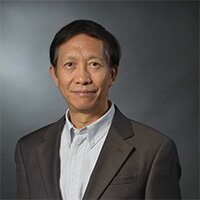Chenggang XU


Biographie
XU Chenggang est professeur d'économie à la Graduate School of Business de Cheung Kong. Il a obtenu son doctorat en économie de Harvard en 1991. Il a enseigné à la London School of Economics (1991-2009), à l'Université de Hong Kong (2009-2016) en tant que professeur Chung Hon-Dak en développement économique et en tant que professeur titulaire en développement économique à l'Université Tshinghua (2002 -) et à l'Université nationale de Séoul en tant que professeur d'université de classe mondiale. Il a également enseigné et travaillé à Harvard (1992-2002), au FMI et à l'Académie chinoise des sciences sociales. Il était président de l'Association asiatique de droit et d'économie. Il est membre du conseil de l'Institut Ronald Coase (RCI) et chercheur universitaire au CEPR. Il a remporté le prix économique Sun Yefang en 2013. Il est l'un des premiers récipiendaires du prix économique de Chine (2016).
Publications
- The Pitfalls of a Centralized Bureaucracy, Acceptance speech for 2016 China’s Economics Prize, Chenggang Xu, Cheung Kong Graduate School of Business.
- Gan, Jie, Yan Guo, and Chenggang Xu (2017). “China’s Decentralized Privatization and Change of Control Rights.” Review of Financial Studies. 2017.
- Xu, Chenggang (2017), “Capitalism and Socialism: Review of Kornai’s Dynamism, Rivalry, and the Surplus Economy,”the Journal of Economic Literature. 2017.
- Guo, Di, Kun Jiang, and Chenggang Xu (2017), “Institution and Managerial Task Allocation: Evidence from Chinese Entrepreneurs,” Journal of Human Capital. Vol.11, No.3.
- Chenggang Xu (2015). “Political and Economic Institutions of China and Their Influences” Cato Journal. 2015.
- Kim, Byung-Yeon, Jin Wang, and Chenggang Xu (2014),“Development of private sector determines reform and economic development: firm level evidence from all transition economies (私有企业的发展是改革和发展的关键:来自所有转轨经济的企业层面证据),” China Journal of Economics (经济学报), 2014, Vol. 1, No.3: 57-83.
- Guo, Di, Kun Jiang, Byung-Yeon Kim, and Chenggang Xu (2014), “Political Economy of Private Firms in China,” Journal of Comparative Economics, Volume 42, Issue 2, May 2014, Pages 286–303.
- Chenggang Xu, “Institutional Foundations of China’s Structural Problems,” in Masahiko Aoki and Jinglian Wu (eds.), The Chinese Economy: A New Transition, International Economic Association World Congress. Palgrave Macmilla. 2012.
- Chenggang Xu, “The Fundamental Institutions of China’s Reforms and Development,” The Journal of Economic Literature, 2011, 49:4, 1076–1151.
- Svetlana Andrianova, Panicos Demetriades and Chenggang Xu, “Political Economy Origins of Financial Markets in Europe and Asia,” World Development, May, 2011 (Vol. 39, No. 5).
- Chenggang Xu and Xiaobo Zhang, “The Evolution of Chinese Entrepreneurial Firms: Township-Village Enterprises Revisited,” in Wu and Yao (eds.), Reform and Development in China, London and New York: Routledge, 2010; and in Ronald Coase (ed.), China’s Economic Transformation,
- James Kung, Chenggang Xu and Feizhou Zhou, “From Industrialization to Urbanization: The Social Consequences of Changing Fiscal Incentives on Local Governments’ Behavior,” in Joseph E. Stiglitz (ed.), Institutional Design for China’s Evolving Market Economy.
- Julan Du and Chenggang Xu, “What Firms Went Public in China? A Study of Financial Market Regulation,” World Development. 4(37):812-824, April 2009.
- Yan Guo, Jie Gan and Chenggang Xu, “A Nationwide Survey of Privatized Firms in China,” The Seoul Journal of Economics, 21(2), 2008.
- Julan Du and Chenggang Xu, “Market Socialism or Capitalism? Evidence from Chinese Financial Market Development,” in Janos Kornai and Yingyi Qian (eds.), Market and Socialism (the International Economic Association Conference Volume No. 146), New York and London, Palgrave Macmillan, 2008, 88-109.
- Yingyi Qian, Gérard Roland and Chenggang Xu, “Coordinating Reforms in Transition Economies,” in Erik Berglöf, Olivier Blanchard, and Gérard Roland (Eds.), The Economics of Transition: The Fifth Nobel Symposium in Economics. London: Palgrave Macmillan, 2007. pp. 518-546.
- Yingyi Qian, Gérard Roland and Chenggang Xu,”Coordination and Experimentation in M-Form and U-Form Organizations,” Journal of Political Economy, April 2006, vol. 114, no. 2. pp.366-402.
- Katharina Pistor and Chenggang Xu, “Governing Stock Markets in Transition Economies Lessons from China,” American Law and Economics Review, 7(1), 2005. pp.184-210.
- Katharina Pistor and Chenggang Xu, “Governing Emerging Stock Markets: Legal vs. Administrative Governance,” (with Katharina Pistor), Corporate Governance: An International Review,
- Katharina Pistor and Chenggang Xu, “Incomplete Law,” Journal of International Law and Politics, 2004. pp.931-1013.
- Katharina Pistor and Chenggang Xu, “Beyond Law Enforcement – Governing Financial Markets in China and Russia,” in (Janos Kornai and Susan Rose-Ackerman eds.), Building a Trustworthy State: Problems of Post-Socialist Transition. New York and London: Palgrave, 2004. pp.167-190.
- Katharina Pistor and Chenggang Xu, “The Challenge of Incomplete Law And How Different Legal Systems Respond to It,” Project Le Bijuridisme: Une approche économiq ue.
- Haizhou Huang and Chenggang Xu, “Financial Syndication and R&D,” Economics Letters, 2003. 80(2): 141-146.
- Katharina Pistor and Chenggang Xu, “Managers’ Fiduciary Duty and the Enforcement of Incomplete Corporate Law,” in (Curtis Milhaupt ed.), Global Markets, Domestic Institutions, New York: Columbia University Press, July 2003. pp.77-106.
- Katharina Pistor and Chenggang Xu, “Fiduciary Duty in Transitional Civil Law Jurisdictions: Lessons from the Incomplete Law Theory,” Corporate Law: Corporate Governance Law eJournal , 2002 (http://papers.ssrn.com/sol3/papers.cfm?abstract_id=343480).
- Eric Maskin and Chenggang Xu, “Soft Budget Constraint Theories: From Centralization to the Market,” Economics of Transition, 2001. Reprinted in Erik Berglöf, Olivier Blanchard, and Gérard Roland (Eds.), The Economics of Transition: The Fifth Nobel Symposium in Economics. London: Palgrave Macmillan, 2007. pp.12-36.
- Yingyi Qian, Gérard Roland and Chenggang Xu, “Attribute Coordination in Organizations,” Annuals of Economics and Finance, 2(2): 487-518, 2001.
- Yingyi Qian, Gérard Roland and Chenggang Xu, “Coordination in Organizatoins: A Comparative Analsysis,” in (M. Dewatripont et al. Ed.), The Strategic Analysis of Universities: Microeconomic and Management Perspectives, Editions de l’Universite de Bruxelles, 2001. pp. 9-29
- Eric Maskin, Yingyi Qian and Chenggang Xu, “Incentives, Information, and Organizational Form,” Review of Economic Studies, 67(2): 359-378, April 2000.
- Haizhou Huang and Chenggang Xu, “Institutions, Innovations, and Growth,” American Economic Review, 89(2): 438-43, May 1999.
- Haizhou Huang and Chenggang Xu, “Financial Institutions and the Financial Crisis in East Asia,” European Economic Review, 43(4-6): 903-914, April 1999.
- Yingyi Qian, Gérard Roland and Chenggang Xu, “Why is China Different from Eastern Europe? Perspectives from Organization Theory,” European Economic Review, 43(4-6): 1085-1094, April 1999.
- Yingyi Qian and Chenggang Xu, “Innovation and Bureaucracy under Soft and Hard Budget Constraints,” Review of Economic Studies, January, 65(1): 151-164, January 1998.
- Haizhou Huang and Chenggang Xu, “Financial Budget Constraints and the Optimal Choices of R&D Project Financing,” Journal of Comparative Economics, 26(1): 62-79, March 1998.
- Yingyi Qian, Gérard Roland and Chenggang Xu, “Coordinating Activities under Alternative Organizational Forms,” in Eric Maskin and Andras Simonovits (eds), Planning, Shortage and Transformation — Kornai’s Festschrift, MIT Press, 1998. pp.57-80.
- Chenggang Xu and Juzhong Zhuang, “Why China Grew: the role of decentralisation,” in P. Boon, S. Gomulka, and R. Layard (eds.), Emerging from Communism, MIT Press, 1998. pp.183-212.
- Juzhong Zhuang and Chenggang Xu, “Profit Sharing and Financial Performance in Chinese State Enterprises: Evidence from Panel Data,” Economics of Planning, 29(3), 1996. pp.205-222.
- Charles Goodhart and Chenggang Xu, “The Rise of China as an Economic Power,” National Institute Economic Review, No.155, February 1996. pp.56-80.
- Martin L. Weitzman and Chenggang Xu, “Chinese Township Village Enterprises as Vaguely Defined Cooperatives,” Journal of Comparative Economics, 18(2): 121-145, 1994. Reprinted in (Nove, Alect and Thatcher, Ian D. (eds.), (1994)) Markets and Socialism, Elgar Reference Collection, International Library of Critical Writings in Economics, 39, Aldershot, U.K.: Elgar. Reprinted in (Roemer, John-E. ed., 1997) Property relations, incentives and welfare: Proceedings of a conference held in Barcelona, Spain, by the International Economic Association. IEA Conference Volume, no. 115. New York: St. Martin’s Press; London: Macmillan Press, pages 326-51.
- Yingyi Qian and Chenggang Xu, “The M-form Hierarchy and China’s Economic Reform,” European Economic Review, April, 1993. pp.541-548. Translated and published by a Bulgarian economics journal, 1993. Translated and published by Shehui Jingji Zhedu Bijiao (Comparative Social and Economic Systems, No.1, 1993.
- Yingyi Qian and Chenggang Xu, “Why China’s Economic Reforms Differ: The M-form Hierarchy and Entry/Expansion of the Non-State Sector,” with Yingyi Qian, The Economics of Transition, 1(2): 135-170, 1993. This paper was reported as “Reformers tread different roads to capitalism,” in Financial Times, 18 October 1993. Related views were reported by Stephanie Flanders in Financial Times, late September 1996. Translated and published as “A Kinai gazdasagi reform sajatos vonasai,” in Europa Forum (a Hungarian academic journal), 1995. Translated as “Fei guoyouzhi jingji chuxian he chengzhang de zhidu beijing,” in Shehui Kexue Xuebao, Special Issue, 1995.
- Chenggang Xu, A Different Transition Path: Ownership, Performance, and Influence of Chinese Rural Industrial Enterprises, New York and London: Garland Publishing, Inc., 1995.
- Yingyi Qian and Chenggang Xu, “Commitment, Financial Constraints, and Innovation: Market Socialism Reconsidered,” in P.Bardhan and J.Roemer (eds), Market Socialism: The Current Debate. Oxford University Press. 1993. pp.175-189.

Nancy Jones

Arezou Azad

Carla Rita Palmerino



